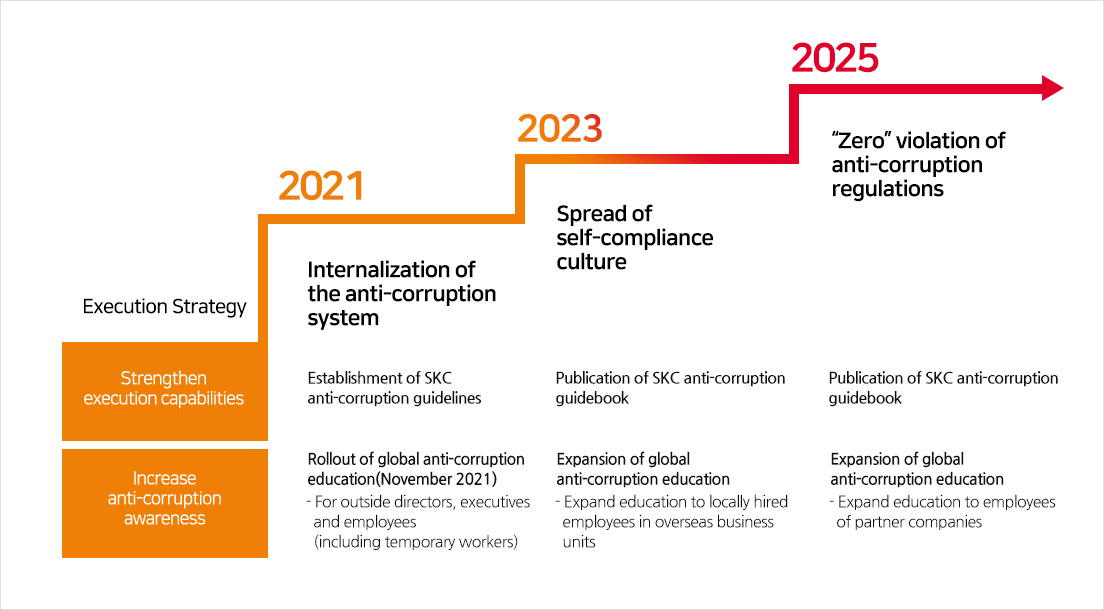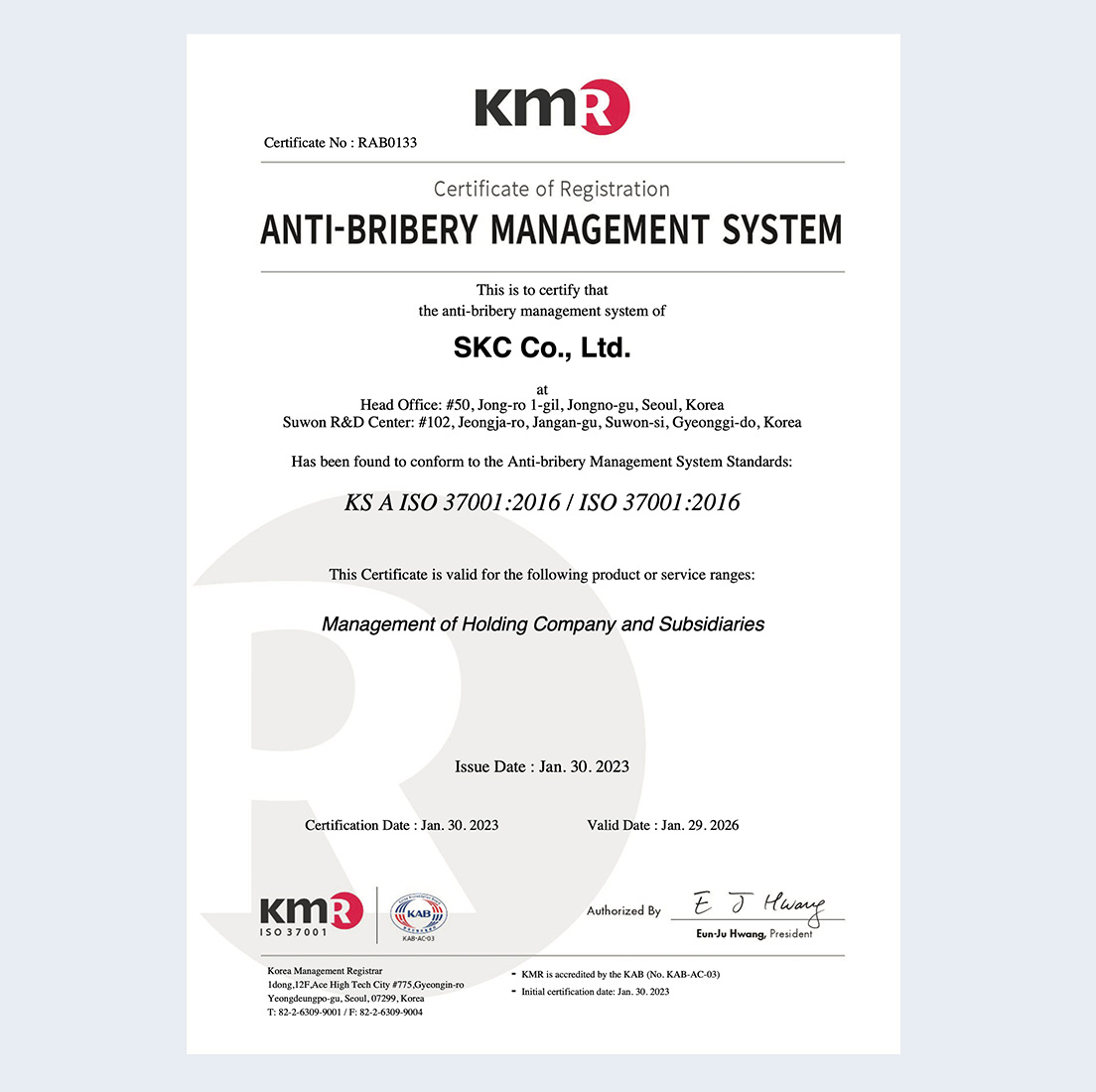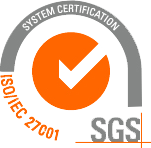SKC
-
CCorporation
 A leading company that strive for the world’s best.
A leading company that strive for the world’s best.
-
CCreation
 Global ESG material solutions company
Global ESG material solutions company
-
CCommunication
 SKC is making efforts to create a better future for all of our partners.
SKC is making efforts to create a better future for all of our partners.
-
CCareer
 SKC is making efforts to create a better future for all of our partners.
SKC is making efforts to create a better future for all of our partners.
Anti-corruption system
SKC will achieve sustainable development by complying with all domestic and overseas anti-corruption laws
SKC Anti-corruption Policy
For pursuing sustainable growth of employees and stakeholders and realizing social value through ESG business management, SKC establishes and operates Anti-corruption Policy as below.
- 1
All employees at SKC are prohibited from acts related to corruption.
- 2
All employees at SKC are required to comply with domestic and international corruption-related laws and the company’s regulations and policies that are applicable to business conducts.
- 3
SKC establishes an anti-corruption management system that meets global standards and continuously improves the level of anti-corruption management through implementation and monitoring by all members.
- 4
SKC promotes employee participation in anti-corruption activities without fear of reprisal through encouraging the raising of concerns in good faith and implementing a protection policy for whistleblowers.
- 5
SKC takes appropriate disciplinary action strictly against personnel who violate the anti-corruption policy and discloses the consequences to employees.
- 6
SKC ensures the authority and independence of the organization and personnel in charge of the anti-corruption.
- 7
SKC's management commit to support the efficient implementation of the anti-corruption management system.
Woncheol Park
CEO & President, SKC

Anti-corruption Practice Guidelines
Specific regulations for the implementation of the Anti-corruption Practice Guidelines
- Principles Compliance with anti-corruption laws / Conduct business ethically and honestly in compliance with the guidelines
- Prohibited Actions Improper Solicitation / Facilitating Payments / Political Donations / Provision of Business Travel Expenses, etc.
- Observance of laws Compliance with domestic and international anti-corruption laws (The Improper Solicitation and Graft, FCPA, Bribery Act, etc.)
-
Wok handling procedures
Anti-bribery Management System(ISO 37001)
– Organization in charge, role of the organization, etc.
- 1. Purpose
- · The purpose of the Anti-corruption Practice Guidelines (hereinafter the “Guidelines”) is to stipulate specific provisions necessary to implement the ethical norms of SKC Corporation and to prevent corrupt practices that impede fair performance of duties, thereby promoting the Company’s sustainable development.
- 2. Applicability
-
· All members of SKC Corporation and major investee companies over which SKC Corporation exercises its management rights (as defined in Article 3, Paragraph 1 of the Investee Company Management Regulations and hereinafter the “Company”) should fully understand and comply with these Guidelines.
· Third-party representatives, including consultants, lawyers, accountants, and lobbyists acting on behalf of the Company, should fully understand and comply with the Guidelines. - 3. Principles
-
· Company members, both domestic and overseas, should comply with all domestic anti-corruption laws, including the Criminal Act, the Act On The Aggravated Punishment Of Specific Crimes, the Act On Combating Bribery Of Foreign Public Officials In International Business Transactions, and the Improper Solicitation And Graft Act, as well as all foreign anti-corruption laws, including anti-corruption laws of countries where the Company operates, such as the U.S. Foreign Corrupt Practices Act, the U.K. Bribery Act, the OECD Anti-Bribery Convention, and Malaysian Anti-Corruption Commission Act 2018 (hereinafter collectively “domestic and foreign anti-corruption laws”).
· Company members should conduct their business ethically and honestly in compliance with these Guidelines in all business processes, including winning businesses from public ordering agencies such as the government and public institutions.
· The foregoing shall NOT apply where members are faced with an imminent violation of fundamental rights and have no choice but to prioritize their own safety. In such cases, however, they must promptly inform the Ethical Management Department. - 4. Definition of Terms
-
· “Domestic and Foreign Officials, etc.” refers to individuals in South Korea or foreign countries, including public officials, their spouses, and the public officials’ immediate family members, who fall under any of the following categories:
A. Any country’s national or local government officials (individuals engaged in legislative, administrative, or judicial affairs of the government regardless of whether appointed or elected)
B. Any country’s public office candidates
C. Any country’s political party officials
D. Employees and executives of a country’s state-owned enterprises (where the government exercises substantial control over all aspects of operation)
E. Employees and executives of public entities or public agencies established to perform public duties
F. Employees and executives of international public organizations (associations of countries formed for specific purposes, including intergovernmental organizations (IGOs) and non-governmental organizations (NGOs))
G. Official agents or consultants of any government
H. Employees and executives of other public-service-related entities or individuals entrusted with public duties
· “Illicit Business Gains” refers to any and all benefits obtained by exerting or inducing influence on domestic and foreign officials, etc. Benefits include securing or receiving favorable decisions on any of the following:
A. Acquiring or retaining business (contract)
B. Confidential information about bidding, business opportunities, or competitors’ sales activities
C. Obtaining licenses or approvals
D. Tariffs, taxes, or fines
E. Administrative or civil litigation
· “Offer, Proposal, or Promise” refers not only to the provisions of money or other items but also includes offers or promises without actual provision being carried out. The term also includes offering, proposing, or promising tangible or intangible benefits to a third party, even if it is known or can be known that all or part of the money or other items delivered to the third party will be passed on to public officials, etc.
· “Money or Other Items” refers to any of the following:
A. All forms of benefits, including money, securities, real estate, goods, accommodation vouchers, membership vouchers, admission tickets, discount vouchers, invitation vouchers, user vouchers, and congratulatory/condolence money.
B. Hospitality and entertainment, including food, alcohol, and golf rounding
C. Conveniences, including transportation, accommodation, event support, and domestic/foreign tour
D. Debt exemption, employment opportunities, granting of privileges여
E. Other tangible and intangible economic benefits
· “Facilitating Payments” refers to small payments made to public officials engaged in routine and repetitive services to expedite their legitimate performance of duties. Typical performance of duties include receiving and processing administrative documents, such as via issuance, as well as customs clearance, shipping, and unloading related to transportation of goods and other matters.
· Terms not explicitly defined in these Guidelines shall be determined by the definitions of local anti-corruption-related laws in each respective country. - 5. Prohibition of Offering Money or Other Items
-
· Company members should not directly or indirectly make any Offer, Proposal, or Promise of Money or Other Items to Domestic and Foreign Officials, etc. in any of the following situations:
A. When offering or receiving Money or Other Items is prohibited by anti-corruption laws of the country to which Domestic and Foreign Officials, etc. belong
B. When the purpose is to obtain Illicit Business Gains
C. When offering Money or Other Items repeatedly to the same individual
D. When offering Money or Other Items to a degree that violates social norms
· Company members who have doubts about whether offering Money or Other Items violates these Guidelines should consult with the Legal Department or Ethical Management Department. - 6. Prohibition of Improper Solicitation
-
· In dealing with domestic officials, Company members should comply with the Prohibition of Improper Solicitation (Appendix 1) stipulated in the Improper Solicitation And Graft Act and the compliance requirements outlined in the above Prohibition of Offering Money or Other Items.
· For the purpose of this clause only, the definition of domestic officials shall be subject to the definition established in the Improper Solicitation And Graft Act.’ The definition is given in Appendix 2. - 7. Prohibition of Business Travel Expenses
-
· Company members should not provide business travel expenses to Domestic and Foreign Officials, etc. in any of the following situations:
A. When offering or receiving travel expenses is prohibited by anti-corruption laws of the country to which Domestic and Foreign Officials, etc. belong
B. When the travel is unrelated to the Company’s business purposes
C. When the provision of travel expenses is not based on the internal regulations of the organization to which the relevant public official belongs
D. When the provision of travel expenses extends beyond the scope of the business travel’s purpose
E. When travel expenses are provided directly to the relevant public official without direct payment to service providers (hotels, airlines, etc.)
· Company members who have doubts about whether certain business travel expenses violate these Guidelines should consult with the Legal Department or Ethical Management Department. - 8. Prohibition of Political Donations
-
· Company members should not make or approve political donations in any form on behalf of the Company to specific government agencies, political parties, etc.
· Exceptions to the Prohibition of Political Donations shall be applied only with the prior written approval of the immediate supervisor (executive or higher) and the Legal Department while complying with relevant laws, including the respective country’s laws related to political funds, election, and anti-corruption. - 9. Limited Charitable Donations
-
· Company members may donate or sponsor legitimate charities related to international organizations for charitable purposes, provided they comply with relevant laws and the Company’s regulations.
However, the payment of donations that may damage the Company’s reputation, may be considered bribes, or are intended for other illicit gains are not allowed - 10. Prohibition of Facilitating Payments
-
· The Company treats facilitating payments the same as bribes, regardless of the amount. Therefore, Company members must not pay facilitating payments to Domestic and Foreign Officials, etc
However, if a Company member receives a request for facilitating payments from a foreign public official in a situation where facilitating payments is permitted by local cultural practices or laws, the member should obtain written approval from the immediate supervisor (executive or higher) and inform the Legal Department and Ethical Management Department.
· Company members who have doubts about whether a payment constitutes a facilitating payment should consult with the Legal Department or Ethical Management Department. - 11. Compliance during Mergers and Acquisitions
-
· In acquiring another company, the Company may be held legally liable for bribery and corruption committed by the target company against domestic and foreign officials in the past. Therefore, the Company should make efforts to identify and resolve legal risks in advance.
· After acquiring the target company, the Company should establish a culture of integrity by running an anti-corruption management system that includes anti-corruption training, inspection/monitoring, and reporting system. - 12. Ledger and Record Management
-
· The Company should maintain detailed and accurate ledgers and records reflecting all transactions, ensuring that they are documented for storage.
· Company members should prepare accounting and financial reports fairly and appropriately in accordance with relevant laws and Company regulations. They should not, for any purpose, record untrue, falsified, or manipulated information or omit any information that should be recorded. - 13. Pledge of Ethical Practice
- · Company members should submit the Pledge of Ethical Practice, which contains compliance with domestic and foreign anti-corruption laws to the Ethical Management Department.
- 14. Training and Counseling
-
· Company members should complete anti-corruption compliance training under the guidance of the Ethical Management Department.
· Company members who have inquiries about these Guidelines in relation to carrying out their work should consult with the Ethical Management Department. - 15. Investigation and Monitoring
- · Company members should actively cooperate in regular or irregular audits or investigations conducted by the Company to determine their compliance with these Guidelines.
- 16. Reporting and Whistleblower Protection
-
· Company members must report any corruption risks identified during work or any suspected violations of relevant laws or these Guidelines to the Ethical Management Department.
· The Company should thoroughly protect whistleblowers, strictly prohibit exposing their identity, retaliating against them, or hunting them down, and shall not impose any other disadvantages, including employment relations. - 17. Punishment for Violation of Practice Guidelines
-
· Violation of these Guidelines by Company members may be considered a breach of company regulations and constitute grounds for disciplinary actions, including dismissal.
· The Company may also report to law enforcement authorities any corrupt behavior of its members if presumed to violate domestic and foreign anti-corruption laws. - ※ Anti-Corruption Management System
-
· The Company has established and operates an anti-corruption management system that captures the content of these Guidelines and reflects ISO 30771 requirements.
· The responsible department is the Ethical Management Department, and the CEO grants sufficient authority to the responsible department to operate the anti-corruption management system effectively.
· The responsible department must not engage in the activities of organizations exposed to corruption risks, to the extent possible, in order to perform its duties independently.
· The responsible department’s roles are described below.
- Set clear objectives for the anti-corruption management system, review corruption risks in each business process, and establish a system to mitigate these risks and meet the objectives.
- Ensure the Company’s compliance with the requirements of anti-corruption laws by establishing specific measures for each work process.
- Continuously improve the suitability, adequacy, and effectiveness of the Company’s anti-corruption management system.
- The responsible department may seek advice from the Legal Department when expert assistance is required, including legal interpretation.
- Activity details
a. Review, enactment, revision, and abolition of related regulations/guidelines, including the Anti-corruption Practice Guidelines.
b. Establishment, distribution, and training of policies/guidelines related to anti-bribery/corruption.
c. Providing interpretation and advice on domestic and foreign anti-corruption laws and these Guidelines.
d. Conducting anti-corruption-related pledges and training for Company members.
e. Building and operating a reporting system
f. Building and operating a year-round corruption monitoring system
g. Taking appropriate sanctions against Company members who violate these Guidelines
[Appendix 1] Compliance with Article 5 (Prohibition of Improper Solicitation) of the Improper Solicitation And Graft Act
1. No Company member shall make any of the following improper solicitations to any domestic public servant, etc. performing his or her duties, directly or through a third party:
① Soliciting to process, in violation of statutes, such tasks as authorization and permission, for which should be processed upon application by a duty-related party;
② Soliciting to mitigate or remit administrative dispositions or punishments such as cancellation of authorization or permission, and imposition of taxes, charges, administrative fines, penalty surcharges, charges for compelling compliance, penalties, or disciplinary actions, in violation of statutes;
③ Soliciting to intervene in or exert influence on the recruitment, promotion, assignment or reassignment of a public servant, etc. or any other personnel matter relating there to, in violation of statutes or regulations;
④ Soliciting to select or reject a person, in violation of statutes, for a position which intervenes in the decision-making of a public institution, such as a member of various deliberation, decision-making, and arbitration committees, and a member of a committee for a test or screening administered by a public institution;
⑤ Soliciting to select or reject a specific individual, organization, or juridical person to be issued an award, prize, or to be chosen as an outstanding institution or person, all of which activities are conducted under the auspice of a public institution, in violation of statutes or regulations;
⑥ Soliciting to disclose, in violation of statutes, duty-related confidential information on tender, auction, development, examination, patent, military affairs, etc.;
⑦ Soliciting to disclose, in violation of statutes, duty-related confidential information on tender, auction, development, examination, patent, military affairs, taxation, etc.;
⑧ Soliciting to intervene or exert influence so that subsidies, incentives, contributions, investments, grants, funds, etc., are assigned to, provided to, invested in, deposited in, lent to, contributed to, or financed to a specific individual, organization, or juridical person, in violation of statutes;
⑨ Soliciting to allow a specific individual, organization, or juridical person to buy or use goods and services that are produced, supplied, or managed by public institutions, at prices different from what is prescribed by statutes, or against normal transaction practices;
⑩ Soliciting to perform various affairs of public institutions in relation to assessment or judgment in violation of statutes or regulations, or to manipulate the results thereof;
⑪ Soliciting to make a specific individual, organization, or juridical person subject to or exempt from administrative guidance, enforcement activities, audit, or investigation; to manipulate the outcome thereof; or to ignore any illegality, in violation of statutes;
⑫ Soliciting to handle investigation of a case, trial, adjudication, decision, mediation, arbitration, reconciliation, or other equivalent affairs, in violation of statutes or regulations;
⑬ Soliciting a public servant, etc. to act beyond the limits of his or her position and authority granted by statutes, or to take any action for which he or she lacks legitimate authority, regarding any and all affairs that may be the subject-matter of improper solicitation as prescribed by above subparagraphs 1 through 12.
2. Notwithstanding paragraph 1, this Act shall not apply to any of the following cases:
① Where demanding particular action such as relief or settlement of infringement on rights in accordance with the procedures or methods prescribed by statutes and standards, or suggesting or proposing enactment, amendment, or rescission of any statute, or standards relevant thereto;
② Where publicly demanding a public servant, etc. to take a particular action;
③ Where an elected public servant, political party, civil society organization, etc., conveys a third party's complaints and grievances for the public interest; make suggestions or proposals regarding establishment, amendment, or rescission of any statute or standard; or make suggestions or proposals regarding improvement of policies, projects, systems, or the administration thereof;
④ Where requesting or demanding a public institution to complete a certain duty within a statutory deadline, or asking confirmation or inquiring about the progress or outcome thereof;
⑤ Where requesting or demanding confirmation or certification for duties or legal relations;
⑥ Where demanding explanation or interpretation of statutes, systems, procedures, etc., related to duties, in the form of inquiry or consultation;
⑦ Any other conduct recognized to be consistent with societal rules and norms.
[Appendix 2] Definition of Public Officials in the Improper Solicitation And Graft Act
1. The term “Public Official” defined in the Improper Solicitation And Graft Act means any of the following public servants or persons engaging in public duties:
① Public officials specified by the State Public Officials Act or the Local Public Officials Act and persons recognized by other Acts as public officials in their qualification, appointment, educational training, service, remuneration, guarantee of status, etc.;
② Heads, executive officers, and employees of organizations related to public service under Article 3-2 of the Public Service Ethics Act and institutions under Article 4 of the Act on the Management of Public Institutions;
③ Heads, faculty members, executive officers, and employees of schools of each level established under the Elementary and Secondary Education Act, the Higher Education Act, the Early Childhood Education Act, or any other statute; and educational foundations established under the Private School Act.
④ Representatives, executive officers, and employees of press organizations defined by subparagraph 12 of Article 2 of the Act on Press Arbitration and Remedies for Damage Caused by Press Reports.
[Notes]
Upper limits of food, congratulatory/condolence money, gifts, etc. for public officials
① Food (meals, refreshments, alcoholic beverages, drinks, and other equivalents shared by the provider and public officials): KRW 30,000
② Congratulatory/Condolence expense: KRW 50,000 (However, wreaths and artificial flowers instead of congratulatory/condolence money are set at KRW 100,000.)
③ Gift (Money, securities, and other equivalents): KRW 50,000 (However, agricultural/fishery products and processed agricultural/fishery products are set at KRW 100,000.)
Upper limits of honorarium for public officials
① Public officials specified by the State Public Officials Act or the Local Public Officials Act and persons recognized by other Acts as public officials in their qualification, appointment, educational training, service, remuneration, guarantee of status, etc.: KRW 400,000
② Heads, executive officers, and employees of organizations related to public service and institutions: KRW 400,000
③ Heads, faculty members, executive officers, and employees of schools and educational foundations and representatives, executive officers, and employees of press organizations: KRW 1,000,000.
Addenda
① This Anti-corruption Practice Guidelines shall take effect on October 23, 2023.
Mid- to long-term plan for operating the anti-corruption system

ISO 37001 (Anti-bribery management system) Certification

